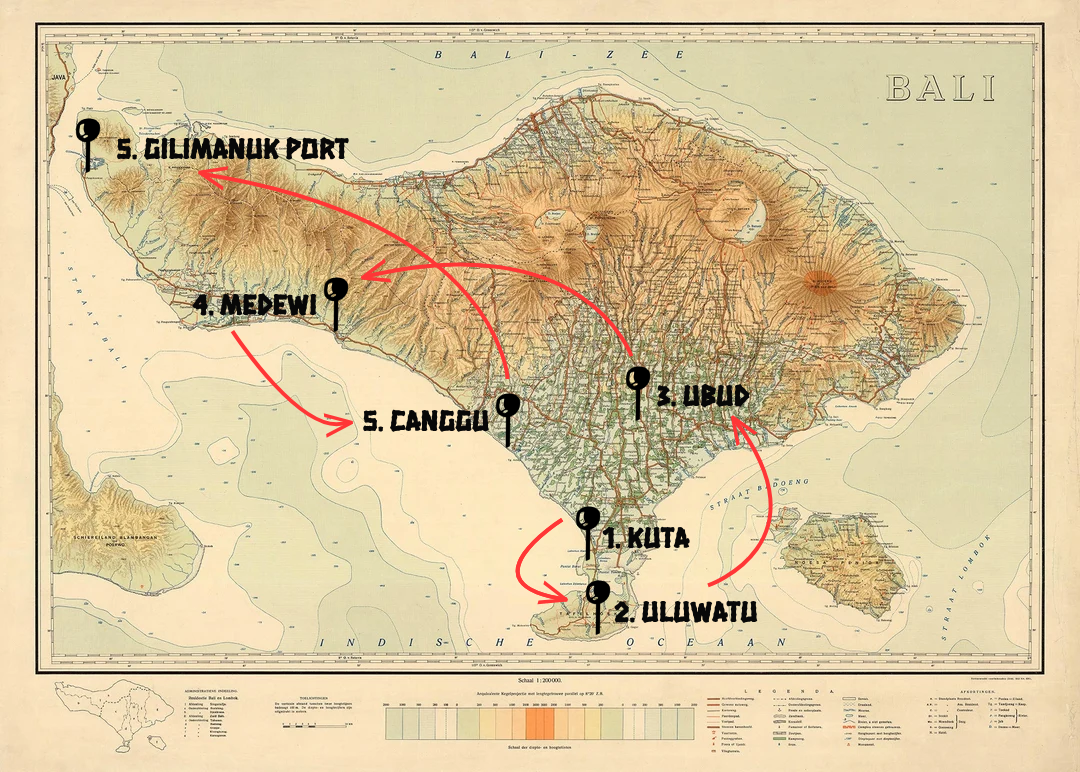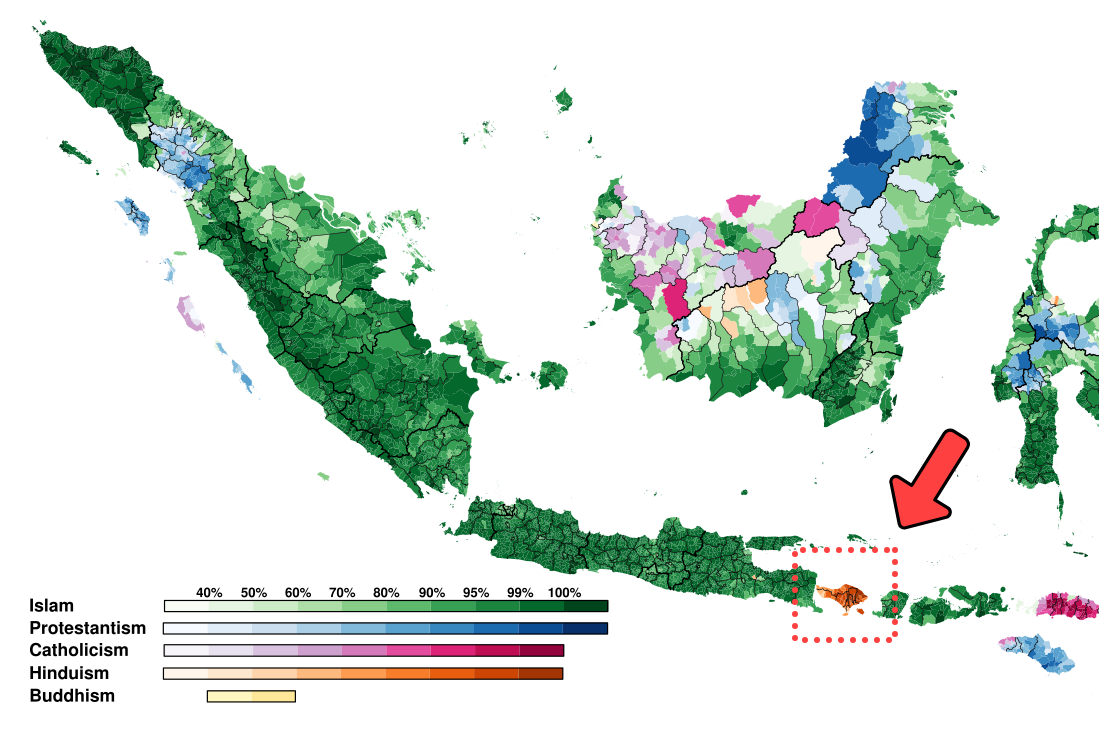the emerald of the equator
December 20, 2024
We have now been travelling for two weeks. Here’s where we’ve ended up so far:

canang sari #
As I would walk along Bali’s streets, I kept noticing little collections of herbs and incense in the front of houses and shops. I learnt that these are called Canang Sari, which is a daily offering made by Balinese Hindus and it is an integral part of their religion and considered the most important form of prayer. It appears the ‘recipe’ of these offerings varies, but at its core features a combination of coconut leaves, tobacco, betel nuts, lime, gambier, flowers, incense and a small offering of food.

Bali is very different from the rest of Indonesia in that it is majority Hindu, whereas most of the population (~87% according to the Ministry of Home Affairs) follows Islam.

kuta #
We started in Kuta as it was closest to the airport. As expected, Kuta was not very nice. A lot of concrete and it suffers from overtourism.
uluwatu #
We decided to leave Kuta for somewhere more peaceful and settled on Uluwatu, down in the southern part of the island. It was relaxed here, and much more green with plenty of flora and fauna. We stayed here for three days at a place called Uluwatu Made Guesthouse which was run by a sweet older man. We mostly kept to ourselves, had swims in the pool and walked around the local streets.
’the best club in asia’ #
We visited Savaya, which is touted as one of Asia’s best clubs. Surprisingly, there were very few people. The view from the cube bar is pretty astonishing, and the venue itself felt quite sophisticated.



ubud #
After three days in Uluwatu, we decided to travel up to Ubud in the centre of the island. As I suspected, Ubud ended up being one of our favourite places in Bali as it was quite lush and cool. There was less of a focus on a party lifestyle, and more of a focus on wellness and visiting the surrounding nature. That being said, we ended up besting all the other travellers in our hostel’s beer drinking competition.

campuhan ridge walk #
One of the first things we did was go for a walk up the Campuhan Ridge Walk.

The path soon turned into a road where we could see some ricefields with some local farmers hard at work.



the tegallalang ricefields #
One of my favourite things we saw in Ubud were the Tegallalang Ricefields, which are these sprawling, layered ricefields unique to Bali.


What I found particularly interesting about the ricefields, and what drew me to them in the first place, is the irrigation system that they use called subak. Subak is a cooperative water management system that originates back to the 9th century, and is tied to the Balinese principle of Tri Hita Karna which is about maintaining a harmonious relationship between the environment and its people.
Many farmers using the subak system do not need to use fertilisers or pesticides, and the system is egalitarian and democratic, with the farmers of the terraces having meetings and regularly rotating crops in sync with each other in order to control the amount of insects present on the farms. The sheer size of these terraces are just as impressive, with there being 19,500 hectares (or 195 sq kms) of race paddies managed on the scale of a drainage basin.







tegenungan waterfall #
Not much to say here - we saw a waterfall, it was pretty. We were not allowed to swim underneath it, however, as it is rainy seasons and objects easily fall down during this time.

pura tirta empul #
Like many other tourists, we visited the Pura Tirta Empul, and ended up donning some sarongs before dipping our heads under the running water fountains. This is a Hindu Balinese ritual called Melukat where one cleanses their mind, body and spirit.


surfing in medewi #
After many days in Ubud, we decided we wanted to get away from the popular spots and made the 3-hour car ride to a small town called Medewi, on the west coast of the island. Here, locals greeted us just to say hello, and the general atmosphere of the town felt relaxed and laidback. The town is known for surfing, and in particular for having the island’s longest continuous left-hand point break (this is a surfing term that I only learnt recently). Naturally, we decided to get some surf lessons from the locals, despite not having surfed in 20+ years.
Surfing is hard work, and I could definitely feel it in my body afterwards, particularly my shoulders. My eyes also stung from the salt water. Despite these setbacks I did manage to stand on the board for about a second before jumping off. We also made the mistake of choosing what is considered an intermediate-to-expert level beach, so that’s on us. Had a great time though.
In the evening, we had dinner at a local warung and I had a fresh lobster dinner that had been caught that morning by a local fisherman.

seeing friends in canggu #
We decided to return to the business of Bali’s inner west coast and settled in Canggu. Here, we managed to catch up with two friends we had made in Ubud, and we all visited Tanah Lot together.




catching the ferry to east java #
After having spent two weeks in Bali, we felt it was time to move on, and so we decided to drive up to Gilimanuk Port to catch the ferry across to Java The ferry took about an hour to cross the bay.




java #
So, we’re in Java. We started off spending a night in the coastal town of Banyuwangi. The next day, we hopped onto an 13-hour overnight bus from Banyuwangi to Yogyakarta, as the train tickets were all sold out.
yogyakarta #
After arriving in Yogyakarta, we sadly only had one day to enjoy the city so we ventured to Malioboro Street which is one of the main pedestrian streets in the city and ended up at a road-side warung. I ended up getting a chicken and vegetable noodle soup dish that had a strong turmeric flavour.

taman mini #
The next day, Jade and I caught the train to Jakarta, despite many locals warning us about it.
Our first day we made sure to visit the attraction that we were most curious about - Taman Mini. Taman Mini is a large park that shows off what Indonesian daily life and culture is like in each of its provinces (26 or so in 1975 when the park was built), with a section for each province displaying varying architecture, clothing, dance, food, traditions, etc. There is also an IMAX in the park, as well as fifteen different museums. Oh, and there is also a bird park. And komodo dragons. It’s an unreal place.







Something that was particularly strange was their Disney-esque castle they had, which had cracked tiles and was quite run down, but also seemed to the main attraction of the park? The doors on the front were locked, but we were curious so we walked around the back of the castle and managed to find some stairs to go up into the building.




On the 24th, we caught our flight from Jakarta to Singapore and bid adieu to Indonesia, and we ended up crossing over into Christmas whilst on the plane.